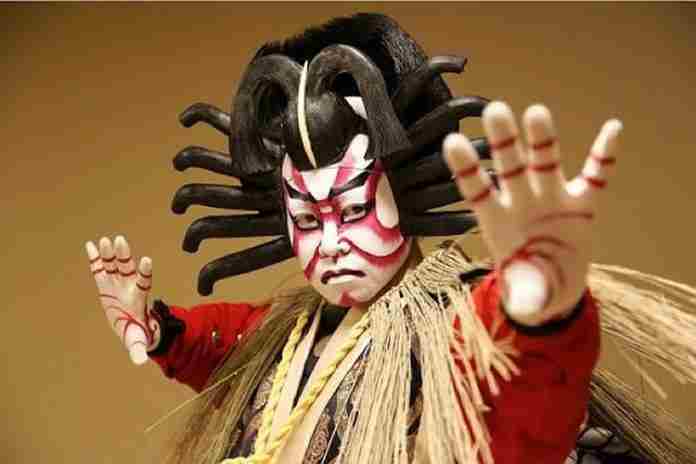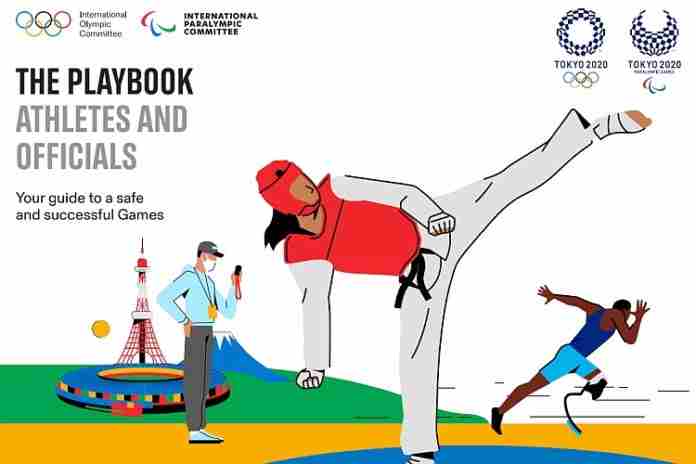(★ Friends: Yea! With our 44th donor toward our December bill for server and support costs, we’re a little over 100% of our goal! If you would like to help us prep for June’s invoice, please donate here. Your enthusiasm is the reason this site keeps going. ★)
Merriam-Webster’s short definition of “Kabuki” is “traditional Japanese popular drama performed with highly stylized singing and dancing.” That’s exactly where the Tokyo 2020 Olympic organizing committee finds itself now with the formal resignation on Friday of its President, Yoshio Mori.
Just nine days after speaking to a meeting of the Japanese Olympic Committee and making remarks about women talking too much at board meetings, Mori, 83 and a former Prime Minister of Japan, resigned during a specially-called meeting of Tokyo 2020 Executive Board and Council members.
Mori is reported to have told the attendees, “There has been much turmoil in recent weeks due to my inappropriate behavior, and for that I apologize” and “What is important is to hold the Olympics in July, so I cannot stand in the way of preparations. If I cause trouble by remaining in the job, our efforts will all be wasted.”
The next step is to select a successor to Mori as Tokyo 2020 President. Chief executive Toshiro Muto told a news conference on Friday that a selection board will be assembled quickly and “will consist of less than 10 members of the Tokyo 2020 executive board, Muto said, half of whom will be women.”
This is also a quick change from reports on Thursday that Mori had asked 84-year-old Saburo Kawabuchi, former head of the Japan Football Association, to take his place, and was willing to do so, as he is already serving as the mayor of the Olympic Village. But Kawabuchi reversed course and declined the invitation on Friday, clearing the way for the to-be-formed committee, to be headed by Fujio Mitarai, chairman of Canon Inc., who also serves as honorary president of the organizing committee.
The Tokyo 2020 organizing committee’s Web site included a short note on its home page under the headline declaring Mori’s resignation:
“With just over five months to go before the opening of the Tokyo 2020 Games, President Mori’s resignation may be a cause of concern to you. However, we ensure you that we will proceed with the appointment of a successor in a swift and transparent manner in order to limit the impact on our preparation for the Games.
“We will also consider specific actions to take, in light of opinions and recommendations voiced at today’s gathering, regarding how we can use this opportunity to further promote gender equality in society.
“Tokyo 2020 would be most grateful for your continued cooperation as we work towards hosting the Games this summer. All of us at the Organising Committee will do our utmost to re-earn your trust, as we renew our commitment to contribute to society through the hosting of the Tokyo 2020 Games.”
Tokyo Governor Yuriko Koike, whose role in the Games is critical as the Tokyo Metropolitan Government is, in fact, the leading supporter of the event, told a Friday news conference:
“All eyes are on the transparency of the selection process. The result will largely impact the image Tokyo broadcasts to the rest of the world.”
The International Olympic Committee posted two statements on Friday, with President Thomas Bach commenting:
“The IOC fully respects President Mori’s decision to step down and understands his reasons for doing so. At the same time, we would like to thank him for his outstanding contribution to the organisation of the postponed Olympic and Paralympic Games Tokyo 2020 over the course of the past years. Among his many accomplishments, President Mori helped to make Tokyo the best-ever prepared Olympic city. The IOC will continue working hand-in-hand with his successor to deliver safe and secure Olympic Games Tokyo 2020 in 2021.”
A second statement, of approval of the committee to replace Mori, included:
“The International Olympic Committee (IOC) welcomes the establishment and composition of a Candidate Review Committee for the appointment of the next President of the Tokyo 2020 Organising Committee. It applauds the decision to have equal gender representation on the Review Committee, including athletes’ representatives, and the commitment to transparency. This is a clear commitment to gender equality, which is fully in line with Olympic Agenda 2020, the IOC’s strategic roadmap.”
So where are we now? Five points to consider:
● Mori’s comments have ignited a societal storm in Japan which may have implications far beyond the Games. A change.org petition to “properly address” his remarks drew 147,836 signatures by Friday and is still open.
What happens to the gender-equality movement in the country now is unknown, but could be significant. One example: the Kabuki concept in theater was created around 1600 featuring women, but by 1629, women were banned from this format and still are – at least formally – today. If Mori’s comments are the catalyst for major change in Japan, then the legacy of the 2020/2021 Olympic Games will indeed be dramatic and historic.
● The winner in all of this is Koike, 68. First elected to public office in 1992, she has served as Minister of the Environment and, for 54 days, Minister of Defense; she was elected as Tokyo Governor in 2016 and reelected in 2020 with 59.7% of the vote.
An independent, she clearly has her eyes on becoming Prime Minister, but the Liberal Democratic Party and allies hold 282 of the 465 seats in the Diet (60.6%) going into elections this October. Nonetheless, she is a power to be reckoned with.
● The organizing effort for the Games won’t change much with Mori’s departure. Most importantly, Muto is remaining as the senior executive in charge and while he doesn’t have Mori’s national profile, he continues to lead the more than 1,000 staff members getting ready to stage the Olympic and Paralympic Games.
Remember, too, that the Tokyo organizers have been in crisis before, in fact just a year ago when the coronavirus was becoming a serious issue in Asia. Tokyo 2020 was ready to stage the Games, and will be ready this time.
Having served on multiple organizing committees myself, I can vouch for the usual reaction to crisis as “we will show you what we can do.” The staging of the Games continues in good hands.
● The coronavirus is still a problem, and the IOC and the Japanese organizers must continue to monitor the situation and perhaps adopt even more restrictive measures to allow the Games to take place.
The easiest step to implement will be to refuse entry to foreign spectators. This will free up hotel rooms across the Tokyo area, which could be partially filled by those National Olympic Committees with money and ease the number of people sleeping in the Olympic Village. The newly-announced restrictions on news media – especially press and photographers – is going to lessen their attendance in Tokyo and will hit the Paralympic Games especially hard.
Given the continuing cancellation and postponement of qualifying events worldwide, it may be that not all of the available quota places for the Games can be filled. Fine, so be it. In this case – and while no one will ever publicly say that every possible athlete slot should not be filled – less really will be more (and safer).
● Before he exited, Mori identified the significant issue threatening the success of the event: public apathy. While his comments caused a reported 400 or so volunteers to recuse themselves from the Games – out of about 80,000 – there was this:
“A Kyodo News survey conducted over the weekend [6-7 February] found that 47.1 percent think the Olympics and Paralympics should be postponed again due to the coronavirus pandemic, while 35.2 percent believe the games should be canceled. Just 14.5 percent said they should be held as planned.”
That’s not good. Host cities often do not get Olympic fever until late and the pivot point is often the beginning of the torch relay in the host country. The 2021 version is scheduled to start on 25 March from Fukushima – site of the 2011 nuclear disaster – and touch all 47 prefectures in the country.
The public reaction to the relay, and to competitions such as the U.S. Olympic Trials in gymnastics, swimming and track & field, where young men and women are giving every effort to try to make it to Tokyo, will be key in reviving – if possible – public interest and support of the Games, regardless of the number of spectators allowed in the venues.
Back in September 2013, when Tokyo was selected by the IOC to host the 2020 Games, then-BBC sports editor David Bond wrote:
“There is no doubt that after all the problems the IOC has been experiencing in Sochi and Rio, they were looking for a safe pair of hands. Tokyo’s bid was ranked number one in the technical assessment carried out by the IOC evaluation commission in June.
“Add to that the commercial allure of Japan’s well-established sports and media market and it’s easy to see why they were such a popular choice.”
Maybe not as popular any more, but without question still as safe a pair of hands as could be hoped for after the unprecedented impact of Covid-19 and the self-inflicted end of seven years of Yoshiro Mori as the head of what should turn out to be a very fine organizing committee in Tokyo.
Rich Perelman
Editor
You can receive our exclusive TSX Report by e-mail by clicking here. You can also refer a friend by clicking here, and can donate here to keep this site going.
For our 649-event International Sports Calendar for 2021 and beyond, by date and by sport, click here!




















